Hi all!
I would like to share a grouping belonging to my grandfather, Giorgos Papadopoulos, who served during the Greek Civil War and all the info I could gather about his service from related literature and by interviewing him. Here we go...
Regards, Giorgos
Born in 1924, he was to be enlisted in 1945, but since there were no structures and resources for the training of recruits, pre-war reservists were called to arms in the National Guard. In 1946 the first armed conflicts began and the continuous service (3rd call to arms) for these men was creating a major political problem. In 1947, the first recruits with no previous service were called to arms and among them, my grandfather, on March 30, 1947, in the Basic Training Center of Alexandroupoli, Evros.
These photos were taken during his basic training.
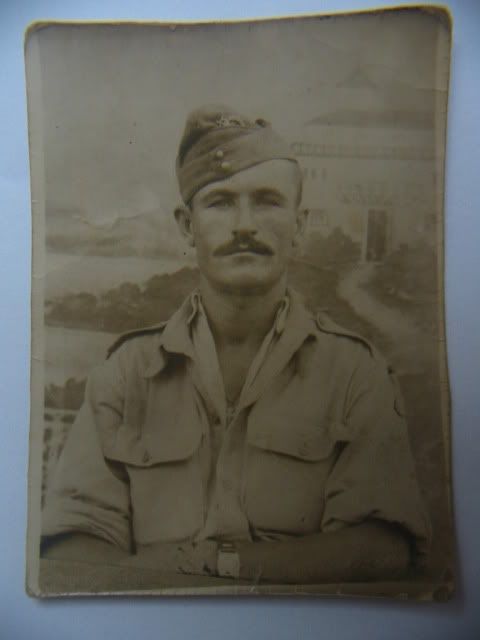

Note the British KD uniform, side cap, p37 webbing and MkII helmet (in its original configuration).
His basic training was rather fast, as he was transferred to 559 Infantry Battalion (stationed at that time in Pentalofos, Evros) of the 27th Brigade, VII Infantry Division, which belonged to the 3rd Army Corps. The 3rd Army Corps controlled the area of Central and Eastern Macedonia and Western Thrace, where the geography dictated a war based on small scale operations for both sides and sabotage techniques for the Democratic Army. This sector didn't see any major battles, but the way in which the war was conducted here, shaped really stressful conditions.
In Pentalofos, he spent some time in guard duties on the Greek-Bulgarian and Greek-Turkish borders. He remembers his chatting with a Turkish 2nd Lt., the surrendering of some Bulgarian soldiers defecting from Bulgaria and some skirmishes with Bulgarian outposts and partisans of the Democratic Army.
Here is a photo of him (right) and LMG gunner Goulios.

On October 29, 1947 he was sent to Thessaloniki, to be trained as an NCO. He was sent there with some other men of his unit and they spent 5-6 days in civilian clothing, riding the trams, before reporting for duty! The training took place in the building of the local YMCA. During his stay there, members of the Communist Party planned an attack on the building, but they were betrayed by one of their own. He attended the Court Martial, where some of these men were sentenced to death and executed.
On December 1947, he returned to Pentalofos and on January 1, 1948, was promoted to Corporal. These are his stripes.

He spent his time on guard and patrol duties in Pentalofos and around the area of Soufli, where he remembers something characteristic of the type of war fought in the area: The Democratic Army was sabotaging and mining the road and railroad network, so much of the patrolling was done around there. One time, they searched an old woman, hiding a Tellermine in her lamb's fodder.
Here is a photo of him (right) and a soldier called Sidiropoulos (left), on horseback, during a patrol.
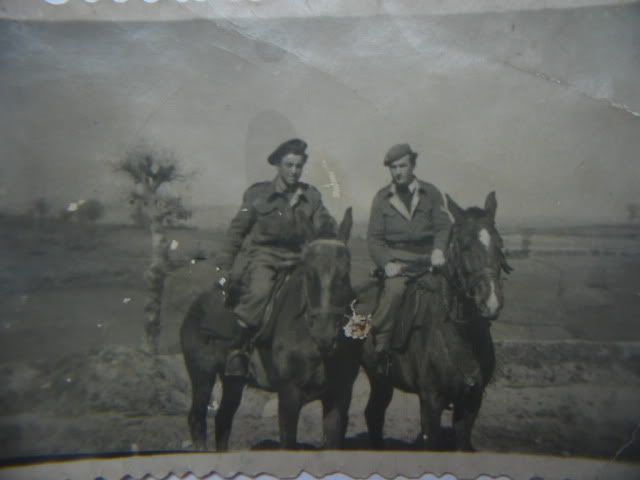
He took part in reconaissance and battles near Siderokastron, Serres, where the Democratic Army, using the abandoned Metaxas' Line fortresses, was directing artillery fire against the railway network and attacked the nearby villages' National Guard and armed volunteers' detachments.
On September 14, he was promoted to Sergeant and on 30 he was documented a reservist, although he was not to be discharged till the end of the war. He spent this winter in Echinos, in the north of my hometown, Xanthi, on guard and patrol duties. One day, showing his... temperament, he was wearing red shoes and white socks in the outpost, testing the nerves of his officers, who actually later gave up all hope!
Here are some photos of him around that time. Note the British sand colour beret, which was privately purchased and still is highly cherished by him and the divisional patch on his BD's left sleeve.



On December 6, 1948 he took a 6-day leave, but he returned... on January 10, 1949, as he preferred spending his time with my grandmother! The time passed again with the usual patrols, ambushes and minor skirmishes, till May 1948, when he took part in the battle of Metaxades.
The 559 Inf. Battalion want as a relief to the besieged Army, National Guard, Gendarmerie and volunteers' guard of the village. Being under fire by 2 field guns and 6 mortars, the CO (Col. Theodorakopoulos) decided to force entry in a nearby village, Vrysika, without reconnaisance, although other officers insisted on the opposite. The battalion was ambushed, nearly surrounded and captured and forced to retreat under heavy fire. With the CO MIA, my grandfather was ordered by the Brigadier to recon through the village of Ladi and then take defensive positions guarding the arriving friendly artillery.
After the end of the battle, since the partisans had fled, he was ordered to transport POWs and his 30 horses to Didymoteicho, by catching the train. On the way, one of his men stepped on a mine and died in his arms.
This photo must have been taken around this time. The MG belts are taken by captured partisans.

On August 9, 1948 he was transferred to the Divisional HQ in Kavala, to be trained as Intelligence NCO and stayed there till September 1.

During this time, the war was coming to an end, with the Democratic Army losing its strongholds in Vitsi and Grammos. In the 3rd Corps' sector, the decisive blow was to be given in Beles, against the remaining forces using again the abandoned Metaxas' Line fortesses. After small scale battles, the partisans fled to Bulgaria and the operation was complete.
These photos were taken just after. Note the US boots and caps. At that time, the US had completely taken over the supplying of the National Army from the British. Note also his long hair (for a soldier). When ordered by an officer to cut it, he answered "Why don't you come and cut it yourself?"


He was later transferred to Stavroupoli, again to the north of Xanthi, commanding the guard of 3 pillboxes. On September 26, he went on a 10 days leave, returning... on November 12, after he was documented as missing! After 36 months of service, he was discharged on December 6, 1949.
Here is his service booklet and the pages with the related entries:








And his discharge papers:

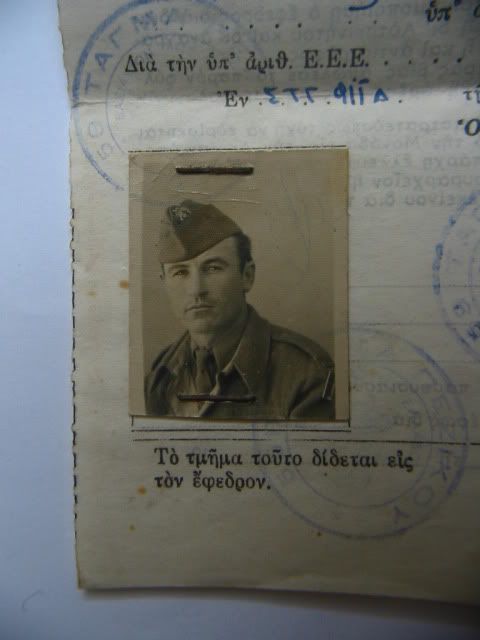

His conduct is noted as "flawless", something that proves what he said, that whatever he did, the officers did forgive him, as they trusted and liked him.
In these last photos, he is wearing this wartime made, US side cap:
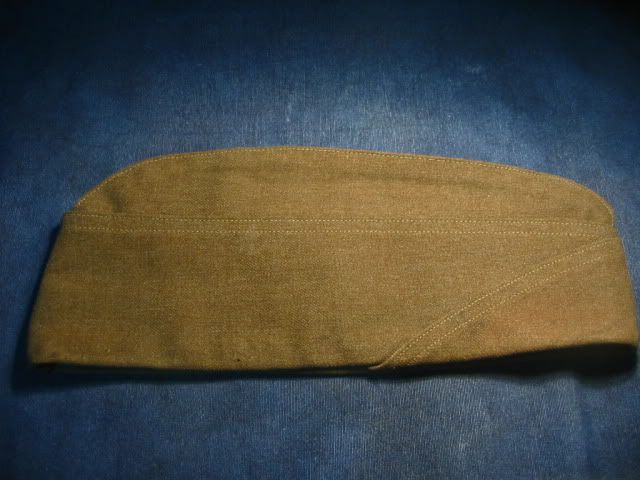
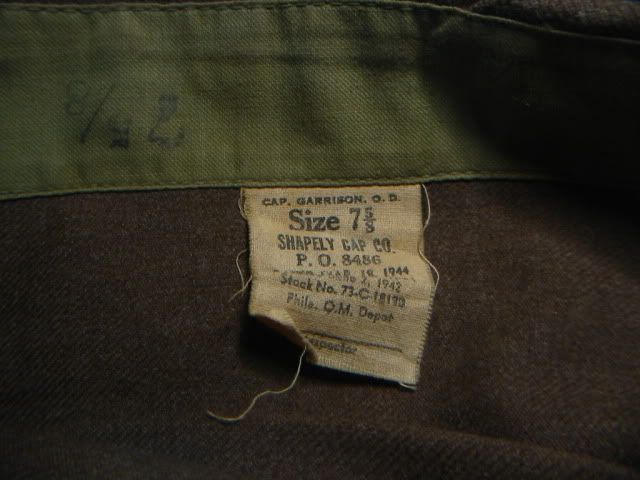
I would like to share a grouping belonging to my grandfather, Giorgos Papadopoulos, who served during the Greek Civil War and all the info I could gather about his service from related literature and by interviewing him. Here we go...
Regards, Giorgos
Born in 1924, he was to be enlisted in 1945, but since there were no structures and resources for the training of recruits, pre-war reservists were called to arms in the National Guard. In 1946 the first armed conflicts began and the continuous service (3rd call to arms) for these men was creating a major political problem. In 1947, the first recruits with no previous service were called to arms and among them, my grandfather, on March 30, 1947, in the Basic Training Center of Alexandroupoli, Evros.
These photos were taken during his basic training.


Note the British KD uniform, side cap, p37 webbing and MkII helmet (in its original configuration).
His basic training was rather fast, as he was transferred to 559 Infantry Battalion (stationed at that time in Pentalofos, Evros) of the 27th Brigade, VII Infantry Division, which belonged to the 3rd Army Corps. The 3rd Army Corps controlled the area of Central and Eastern Macedonia and Western Thrace, where the geography dictated a war based on small scale operations for both sides and sabotage techniques for the Democratic Army. This sector didn't see any major battles, but the way in which the war was conducted here, shaped really stressful conditions.
In Pentalofos, he spent some time in guard duties on the Greek-Bulgarian and Greek-Turkish borders. He remembers his chatting with a Turkish 2nd Lt., the surrendering of some Bulgarian soldiers defecting from Bulgaria and some skirmishes with Bulgarian outposts and partisans of the Democratic Army.
Here is a photo of him (right) and LMG gunner Goulios.

On October 29, 1947 he was sent to Thessaloniki, to be trained as an NCO. He was sent there with some other men of his unit and they spent 5-6 days in civilian clothing, riding the trams, before reporting for duty! The training took place in the building of the local YMCA. During his stay there, members of the Communist Party planned an attack on the building, but they were betrayed by one of their own. He attended the Court Martial, where some of these men were sentenced to death and executed.
On December 1947, he returned to Pentalofos and on January 1, 1948, was promoted to Corporal. These are his stripes.

He spent his time on guard and patrol duties in Pentalofos and around the area of Soufli, where he remembers something characteristic of the type of war fought in the area: The Democratic Army was sabotaging and mining the road and railroad network, so much of the patrolling was done around there. One time, they searched an old woman, hiding a Tellermine in her lamb's fodder.
Here is a photo of him (right) and a soldier called Sidiropoulos (left), on horseback, during a patrol.

He took part in reconaissance and battles near Siderokastron, Serres, where the Democratic Army, using the abandoned Metaxas' Line fortresses, was directing artillery fire against the railway network and attacked the nearby villages' National Guard and armed volunteers' detachments.
On September 14, he was promoted to Sergeant and on 30 he was documented a reservist, although he was not to be discharged till the end of the war. He spent this winter in Echinos, in the north of my hometown, Xanthi, on guard and patrol duties. One day, showing his... temperament, he was wearing red shoes and white socks in the outpost, testing the nerves of his officers, who actually later gave up all hope!
Here are some photos of him around that time. Note the British sand colour beret, which was privately purchased and still is highly cherished by him and the divisional patch on his BD's left sleeve.



On December 6, 1948 he took a 6-day leave, but he returned... on January 10, 1949, as he preferred spending his time with my grandmother! The time passed again with the usual patrols, ambushes and minor skirmishes, till May 1948, when he took part in the battle of Metaxades.
The 559 Inf. Battalion want as a relief to the besieged Army, National Guard, Gendarmerie and volunteers' guard of the village. Being under fire by 2 field guns and 6 mortars, the CO (Col. Theodorakopoulos) decided to force entry in a nearby village, Vrysika, without reconnaisance, although other officers insisted on the opposite. The battalion was ambushed, nearly surrounded and captured and forced to retreat under heavy fire. With the CO MIA, my grandfather was ordered by the Brigadier to recon through the village of Ladi and then take defensive positions guarding the arriving friendly artillery.
After the end of the battle, since the partisans had fled, he was ordered to transport POWs and his 30 horses to Didymoteicho, by catching the train. On the way, one of his men stepped on a mine and died in his arms.
This photo must have been taken around this time. The MG belts are taken by captured partisans.

On August 9, 1948 he was transferred to the Divisional HQ in Kavala, to be trained as Intelligence NCO and stayed there till September 1.

During this time, the war was coming to an end, with the Democratic Army losing its strongholds in Vitsi and Grammos. In the 3rd Corps' sector, the decisive blow was to be given in Beles, against the remaining forces using again the abandoned Metaxas' Line fortesses. After small scale battles, the partisans fled to Bulgaria and the operation was complete.
These photos were taken just after. Note the US boots and caps. At that time, the US had completely taken over the supplying of the National Army from the British. Note also his long hair (for a soldier). When ordered by an officer to cut it, he answered "Why don't you come and cut it yourself?"


He was later transferred to Stavroupoli, again to the north of Xanthi, commanding the guard of 3 pillboxes. On September 26, he went on a 10 days leave, returning... on November 12, after he was documented as missing! After 36 months of service, he was discharged on December 6, 1949.
Here is his service booklet and the pages with the related entries:








And his discharge papers:



His conduct is noted as "flawless", something that proves what he said, that whatever he did, the officers did forgive him, as they trusted and liked him.
In these last photos, he is wearing this wartime made, US side cap:





Comment